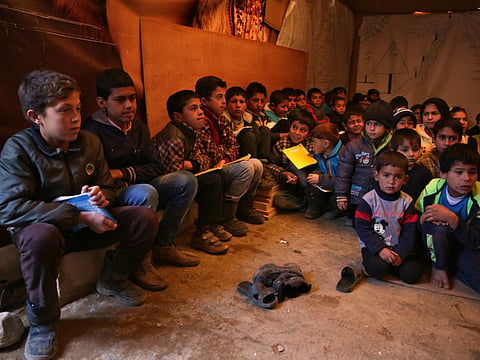Extremism the biggest winner in Syria
The ‘ceasefire’ will not halt Russia’s air campaign. Weakening the rebels and sacrificing civilians for political power are sowing the seeds of future instability

A cessation of hostilities in Syria was agreed upon at the Munich Security Conference on Friday, coming hot on the heels of the release of a new report that estimates that 11.5 per cent of the Syrian population has either been killed or injured as a result of the conflict. Both coincide with a major hike in the humanitarian catastrophes in Syria as tens of thousands of civilians flee from Russia’s continued air strikes on Aleppo.
Crucially, the cessation of hostilities agreement does not bind Russia to halt its air campaign because Russia continues to insist that the campaign is targeting “terrorists”, which is permissible in the agreement. The problem is that in reality, more than 80 per cent of Russia’s strikes have been against the Syrian rebels and not groups such as Daesh (the self-proclaimed Islamic State of Iraq and the Levant) and have caused massive civilian losses.
That the Syrian conflict is one of the bloodiest wars in the modern history of the Middle East is an uncontested fact. But in addition to the importance of not becoming desensitised to the human cost of the conflict, the international community should think seriously about how the war is changing the face of Syria, and what this means for the world.
If the conflict continues as it is today — and it is far from certain that the Munich agreement can be implemented — Syria will head to a future of extremism and long-term unrest that will have global repercussions.
Everyone in Syria is affected by the fighting. The loss of lives and livelihoods is contributing to rising grievances among Syrians — against the Bashar Al Assad regime that is brutally killing its citizens, the international community that is indirectly allowing the conflict to persist through sterile diplomacy, the foreign actors whose self-interest is fuelling the conflict — but above all else, against one another.
We should think seriously about how the war is changing the face of Syria, and what this means for the world
As the Russian air strikes on Aleppo and other areas in Syria continue to mainly target the Syrian rebels and not Daesh, it has become clear that they aim at weakening the rebels so Russia can then set the agenda for ending the conflict and reassert itself as a global superpower. Not only is Daesh taking advantage of Russia’s elimination of its key opponent on the ground, the Syrian rebels, it is also benefiting from the ever-growing discontent within the population.
Al Assad had already sectarianised the conflict through allying himself with Iran and Hezbollah. This strategy has played right into the hands of Daesh and its Sunni victimisation narrative. The Russian attacks on mainly Sunni areas strengthen this further.
Meanwhile, Syria’s moderates are at risk of extinction. The West’s meagre support for moderate Syrian rebels is not enough to enable them to stand up to Russia’s air strikes. While Daesh has dug tunnels in preparation for the aerial bombardment, the Syrian rebels have no such infrastructure. The US recently also severely cut its funding and support for Free Syrian Army factions. Caught between the regime and its allies on one side and Daesh on the other, and without adequate means to resist the Russian air campaign, many fighters are effectively being pushed to form an alliance of convenience with Daesh and other such extremist groups. If this happens, the strategy of the Syrian regime and Russia will have prevailed, as Syria will be left with two main groups: The regime and extremists. Russia and the regime can then appeal to the international community on the basis of fighting terrorism.
But by then, no degree of foreign support will be enough to eradicate extremists in Syria. As the Iraqi experience has shown, it is only through working with the local Sunni population that extremist groups such as Daesh can be weakened. Ramadi could only be taken back from Daesh after Iraq’s Sunni population got involved in fighting it alongside the army. If most of Syria’s Sunni community carries grievances against the ruling regime, Daesh will continue to exist.
Russia’s and Al Assad’s strategy in Syria is shortsighted. The weakening of the Syrian rebels today and the sacrificing of civilians for the sake of political power are planting the seeds for future instability. Russia and Al Assad are changing the face of Syria from a country mostly populated by moderate Muslims into one with sectarian cantons and deep grievances. The biggest winner in this dangerous game is extremism. It is not just the humanitarian catastrophes of Syria today that demand urgent attention. It is also what they mean for the future of Syria and global stability.
— Guardian News & Media Ltd
Lina Khatib is a senior research associate with the Arab Reform Initiative. Formerly, she was the director of the Carnegie Middle East Center in Beirut and is co-founder of Stanford University’s programme on Arab Reform and Democracy.



